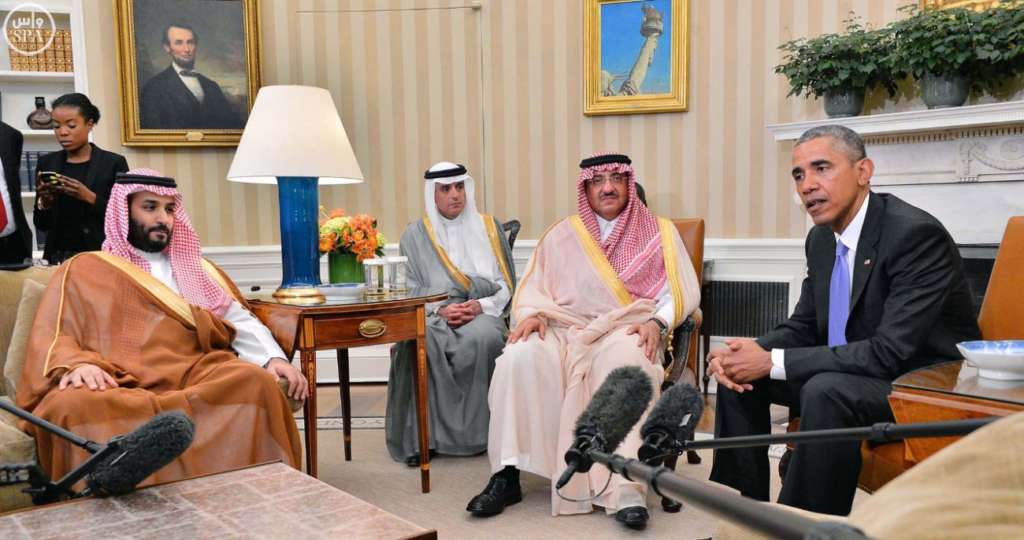“Alliance Rift”, “Alliance Collapse”, “Forever Divorced”, and “The End to a Sweet Honeymoon…” such read the headlines to many newspapers and media outlets over the past two years when predicting the state-of-affairs on the Saudi-U.S. relationship.
Nonetheless, such forecasts of a 70-year-old alliance coming to an end were left unfulfilled. The alliance had faced mightier storms, like the 1973 oil export ban, and still proved strong.
It is true that the two countries differ in their ways when settling regional crises, and that the strategic alliance once shared had been afflicted with a bit of damage and tension over the last period. Atop that, it remains no secret that intertwining policies between Washington and Riyadh have been declassified, and made known, after a long time of being dealt with behind closed curtains. With all that being said, both allies still prove in need of each other.
For example, U.S. provides substantial intelligence support to the Kingdom of Saudi Arabia as to maintain it regional security, while on the other hand, the Kingdom plays a major role in fighting terrorist groups which target both Riyadh and Washington. One should also keep in mind that with a million oil barrels arriving to U.S. ports daily, Saudi Arabia is considered the second major oil supporter of the States.
Albeit disputes knocking on doors here and there, based on the principals of mutual benefit, both countries are dependent to one another. Goals remain constant and details variable.
The Saudi-U.S. conflict is undeniable, yet is not in the profound sense it is being portrayed—analysis claiming that the alliance stands on the verge of utter collapse. The truth is that the ties remain solid, even if tension is detected.
Deputy Crown Prince Mohammad bin Salman bin Abdulaziz visits the States as to lay new foundations for the alliance which function best with changes witnessed by the world.
Moreover, just as much as Riyadh realizes the importance of upholding ties with the world’s most powerful country, U.S. major institutes – not solely the White House- also are aware of the fact that they would be unable to sustain their security and stability in the absence of the world’s major counterterrorism participant and the country most capable of balancing power with absolute rationale.
It is better if one lay aside predictions and hearsay which only chew on words as to belittle the alliance- mistakenly announcing its doom as if it were to happen tomorrow- given that the alliance still stands today, it must be that it is far stronger than what it is being given credit for.
The Custodian of the Two Holy Mosques King Salman bin Abdulaziz had his first official visit, since he rose to power, to Washington last September, while on the other hand the U.S. President made more trips to Saudi Arabia than any other country in the Middle East. Furthermore, this is Prince Mohammed’s third visit to Washington in a year.
One ought to know that textbook cooperation against terrorism cannot possibly be simply hampered over minor dispute in views. Secondary disputes cannot stand in the way of strategic partnership.
No one claims perfection, and the Saudis most definitely do not claim that. Just like others, they are prone to committing mistakes, and should some wish to direct the spotlight to those mistakes, they may, and no one will ever be able to stop them from doing that.
Nevertheless, what is indisputable is that common points remain in abundance and can be used as a mainstay strengthening the historical alliance. There is no escape from the alliance growing stronger, even though some details remain damaged.
One should take into consideration the Saudi’s persistent attempt on fixing their slips day after day. What is more is that Saudi officials themselves admit that the Kingdom’s vision 2030’s success –a great goal to Prince Mohammad’s latest visit-relies on filling up small gaps and establishing partnerships. Besides, there is no doubt that U.S. major companies are capable and willing to establish such partnerships.
The long debate on the strength of Saudi-U.S. ties can be cut short to what Vice President of the Wilson Center Aaron David said when asked on whether the U.S. can withdraw from the region and reconsider its alliance with Saudi Arabia.
David answered with a simple “out of the question”, not because Washington does not want to, but because it can’t; the States’ interests lie in the world’s most sizzling spot (the Middle East), which in turn forces its hand to stay.
Interests alone, not personal benefits, can lay down the foundations to a stronger longer-staying alliance. This is one of the most important rules on which the U.S.-Saudi alliance will be instituted upon in the forthcoming stage.
